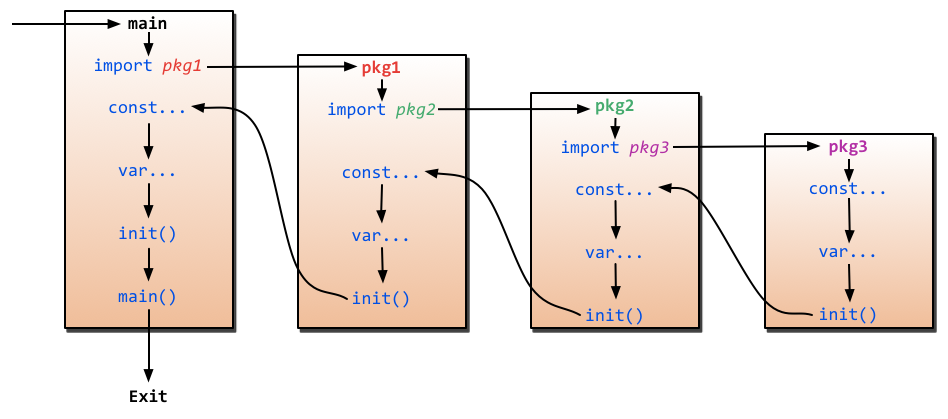When is the init() function run?
I've tried to find a precise explanation of what the init() function does in Go. I read what Effective Go says but I was unsure if I understood fully what it said. The exact sentence I am unsure is the following:
And finally means finally: init is called after all the variable declarations in the package have evaluated their initializers, and those are evaluated only after all the imported packages have been initialized.
What does all the variable declarations in the package have evaluated their initializers mean? Does it mean if you declare "global" variables in a package and its files, init() will not run until all of it is evaluated and then it will run all the init function and then main() when ./main_file_name is ran?
I also read Mark Summerfield's go book the following:
If a package has one or more init() functions they are automatically executed before the main package's main() function is called.
In my understanding, init() is only relevant when you run intend to run main() right? or the Main package. Anyone understands more precisely init() feel free to correct me
Yes assuming you have this:
var WhatIsThe = AnswerToLife()
func AnswerToLife() int { // 1
return 42
}
func init() { // 2
WhatIsThe = 0
}
func main() { // 3
if WhatIsThe == 0 {
fmt.Println("It's all a lie.")
}
}
AnswerToLife() is guaranteed to run before init() is called, and init() is guaranteed to run before main() is called.
Keep in mind that init() is always called, regardless if there's main or not, so if you import a package that has an init function, it will be executed.
Additionally, you can have multiple init() functions per package; they will be executed in the order they show up in the file (after all variables are initialized of course). If they span multiple files, they will be executed in lexical file name order (as pointed out by @benc):
It seems that
init()functions are executed in lexical file name order. The Go spec says "build systems are encouraged to present multiple files belonging to the same package in lexical file name order to a compiler". It seems thatgo buildworks this way.
A lot of the internal Go packages use init() to initialize tables and such, for example https://github.com/golang/go/blob/883bc6/src/compress/bzip2/bzip2.go#L480
See this picture. :)
import --> const --> var --> init()

If a package imports other packages, the imported packages are initialized first.
Current package's constant initialized then.
Current package's variables are initialized then.
Finally,
init()function of current package is called.
A package can have multiple init functions (either in a single file or distributed across multiple files) and they are called in the order in which they are presented to the compiler.
A package will be initialised only once even if it is imported from multiple packages.